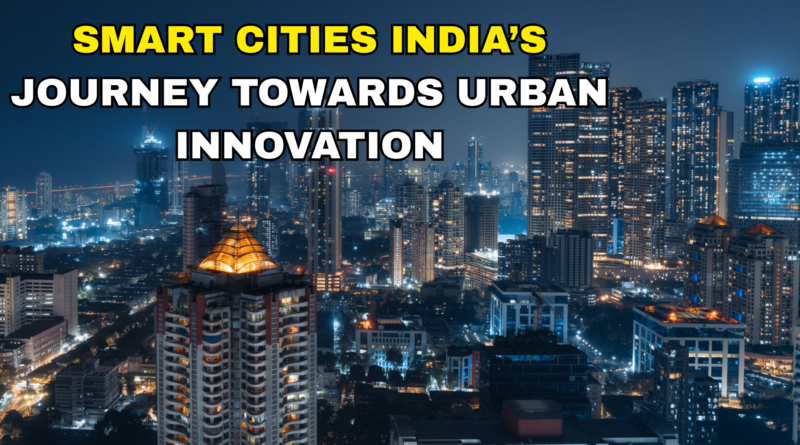SMART CITIES INDIA’S JOURNEY TOWARDS URBAN INNOVATION
India is one of the fastest-growing countries in the world, and its cities are expanding rapidly. With more people moving to urban areas every year, the need for better infrastructure, efficient services, and sustainable living has become more important than ever. To meet these challenges, the Government of India launched the Smart Cities Mission in 2015. The goal of this mission is to transform Indian cities into modern, citizen-friendly, and sustainable urban spaces.
What is a Smart City?
A smart city uses modern technology, data, and digital tools to improve the quality of life for people. It focuses on better planning, improved services like water, electricity, and waste management, efficient transport systems, and digital connectivity. Smart cities are not just about tall buildings or advanced gadgets, but about creating a balance between technology, environment, and human needs.
Some key features of smart cities include:
Clean and sustainable environment.
Efficient use of energy and resources.
Good public transport and less traffic.
Better healthcare and education facilities.
Safety and security for citizens.
Use of technology to deliver government services quickly.
India’s Smart Cities Mission
The Smart Cities Mission started in 2015 with the vision of building 100 smart cities across India. Cities were selected through a competition where state governments proposed plans, and the best ones were chosen. This competitive approach ensured that cities designed practical projects suited to their unique needs.
The mission is not just about building new infrastructure, but also improving old systems. For example, some cities are focusing on smart transport, while others are giving importance to renewable energy, waste management, or digital services.
Key Innovations in Smart Cities
Digital Governance – Many smart cities are using apps and online platforms to provide quick government services. Citizens can now pay bills, register complaints, or get certificates online, saving time and effort.
Smart Transport – Cities like Pune and Surat have introduced intelligent traffic management systems, GPS-based buses, and digital parking solutions to reduce congestion.
Waste Management – Indore, known as India’s cleanest city, uses smart waste collection methods. Garbage is tracked through GPS vehicles, and waste is scientifically processed for recycling.
Renewable Energy – Some cities are promoting solar power and energy-efficient buildings. This reduces pollution and helps fight climate change.
Safety and Security – CCTV cameras, smart street lighting, and emergency response systems are being installed in many cities to make urban areas safer.
Water and Sanitation – Smart sensors are used to detect water leakages, and projects are being developed to ensure 24/7 water supply in some cities.
Examples of Smart Cities in India
Pune (Maharashtra): Introduced smart traffic management, public Wi-Fi, and e-bus services.
Indore (Madhya Pradesh): Famous for its waste management and cleanliness model.
Ahmedabad (Gujarat): Developing smart transport and riverfront projects.
Bhubaneswar (Odisha): Known for its child-friendly and sustainable urban planning.
Visakhapatnam (Andhra Pradesh): Focuses on disaster management and green energy.
These cities show that every smart city project is unique and designed to meet local needs.
Challenges in Building Smart Cities
Even though the Smart Cities Mission has made good progress, there are still many challenges:
High Cost: Developing smart infrastructure requires a lot of money. Many cities struggle with funding.
Technology Gap: Not all citizens are comfortable using digital tools, especially in rural or less-educated areas.
Coordination Issues: Different government departments must work together, which is not always easy.
Maintenance: Building smart systems is one thing, but maintaining them in the long run is another challenge.
Inclusive Growth: Smart cities should benefit everyone, not just the rich or tech-savvy people. Ensuring equality is very important.
The Future of Smart Cities in India
Despite challenges, India’s smart cities mission is moving forward steadily. By 2024, many projects were completed, and others are under progress. In the future, smart cities will play a big role in India’s development by:
Promoting green energy and reducing pollution.
Making cities more digitally connected.
Improving urban mobility with electric buses and metro systems.
Providing better healthcare through telemedicine and e-hospitals.
Ensuring citizen participation in decision-making using digital platforms.
As India continues its journey towards urban innovation, smart cities will help the country face modern challenges like climate change, population growth, and resource shortage.
Conclusion
Smart cities are not just about technology but about creating better living conditions for all citizens.
India’s Smart Cities Mission shows the country’s commitment to building sustainable, inclusive, and modern urban spaces. Though there are difficulties, the progress made so far proves that India is on the right path. With strong planning, citizen participation, and the use of innovation, Indian cities are slowly transforming into hubs of progress and opportunity.
India’s journey towards urban innovation is still in its early stages, but with continued effort, the dream of smarter, cleaner, and more livable cities can become a reality.




